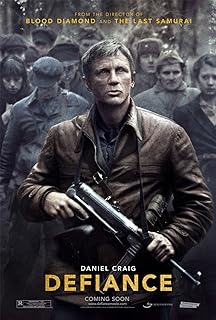電影訊息
電影評論更多影評

2009-01-31 13:16:58
The Landscape of War
The history of Belorussia in World War II is largely ignored at best. Given that, it has become so much harder to depict the story of the Bielski Partisans on the big screen. Only the fact is clear: that the Bielski brothers managed to save over 1,200 Jewish people by hiding in the Nalibocka forest from the mean war machine of the Nazis. What the Partisans did was hardly imaginable today, and may involve some extreme moral challenges that cannot be pictured without causing a emotional discomfort of the audiences.
Good for the director Edward Zwick, he did not mean to compare the Bielskis with 史蒂夫n Spielberg’s German Righteous among the Nations Oskar Schindler, nor did he want to produce a sentimental and moving epic as Schindler’s List. He was very clear about the idea of the picture when he set out to make it: to tell a story about how Jewish people defy their fate of being slaughtered, not that about their being killed and rescued by Germans.
The story-telling may not be a tour de force like that of Schindler’s List, nor does the film has a nemesis character like Amon Goeth, yet the viewing pleasure is not reduced. As always, Edward Zwick did not insert a stereotype evil character into his film, but throw us directly into the historical and ethnic environment of the movie’s settings, and reveal layers and layers of conflicts. Again in this movie he managed to depict complex interaction between multitudes of humanity and a dramatic age full of overwhelming events, while keeping the audiences』 fist clenched and them sitting at the edge of the chair.
A central conflict in this movie is brought to the face of our protagonists by their very purpose: to survive and defy the fate that has descended on their nation. In the huge, all-devouring grinder of the war, to escape being victims, the only way is to become the ones who impose destruction on the enemies. This brings the fundamental conflict into play: to what extent can one gain power while sustaining empathy and humanity. All the other conflicts, such as those between Jewish combatant and non-combatant, and between Jewish and German people, are all developed around the fundamental conflict. These conflicts work as prisms, which refract multiple facets of human nature, which makes the landscape of war more alive and more realistic. The behaviours of the groups of Jew is no longer innocent or morally perfect as some other war movies depicted, but are convincing and arousing compassion.
The director has done a good job telling a story of people in desperate conditions, and was greatly helped by a group of great actors, although many of them are not famous. Although not without caveats, in most part the acting is natural and compelling. You would feel that those are really Jewish people in that time, beaten-up, self-preserving, yet willing to fight beside their charismatic leader. Being often seeing real-life Jewish people, I thought Daniel Craig was too British to act as a Jewish leader, but he really brings out the leader’s spirit. Yet in some action scenes he still reminds me of Bond.
Although the story can well be adapted into a high profile action movie, or at least an epic movie with the excitement of Last Samurai, Zwick has chosen to reflect the day-to-day struggle and sacrifice in the forest, this may make the movie less a block buster, but surely is not a bad thing if we consider its values in preserving a piece of forgotten history. Although there are some inconsistency in the plot, and the first half was a bit slow, Defiance is nevertheless one of the best movies depicting the brave struggles in WWII.
評論

